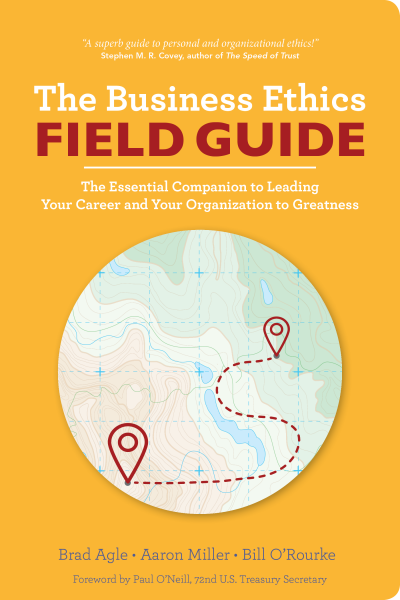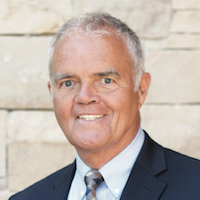The Business Ethics Field Guide
Any cursory online search will reveal thousands of books and articles that try to help you become a better manager or a better leader. According to many of these texts, managing involves planning and budgeting, organizing, controlling, problem solving, and communicating; while leading means establishing direction, aligning people, motivating and inspiring them, and creating change.
In this book, we propose a third set of skills that are often neglected but are just as essential for effective leadership: the ability to clarify individual and organizational values and to find a way forward when these values conflict.
This book will help you develop those skills and apply them in your organization to become a better leader.
[3d-flip-book mode=”thumbnail-lightbox” id=”1047″][/3d-flip-book]
Click to see a preview

The 13 Dilemmas
Here’s a quick rundown of the dilemmas and some of the questions you should be asking:
Standing Up to Power. Your boss or someone else in authority is asking you to do something unethical. Ask yourself: Can I get this done in some other way, without being unethical? How can I help my boss save face?
Made a Promise and World Has Changed. You made a promise, but unexpected events have made it very hard to keep. Ask yourself: Can I still keep my promise, even if costly to me? Does keeping this promise now make it harder to keep other promises?
Intervention. You see something that’s wrong but face risks if you try to stop it. Ask yourself: Are you the right person to intervene or should you recruit help? Can you intervene in a way that creates the least harm to everyone involved?
Conflict of Interests. Your personal interests and your work obligations are at cross purposes with each other. Ask yourself: Who has a right to know the details and have I let them know? Would my actions cause others to question my motives or character?
Suspicions Without Enough Evidence. You suspect something wrong is going on, but how you investigate could harm others. Ask yourself: What happens if I act on the allegations and they are false? Does my bias push me to believe or dismiss too quickly?
Playing Dirty. You have a chance to harm someone who has harmed you. Ask yourself: Would my action really bring about justice? Does my action solve a problem or is it merely revenge?
Skirting the Rules. To accomplish a worthy purpose, you have to go around the rules or break the law. Ask yourself: Would those with authority over the rules/law want you to break them in this case? What are all the reasons the rule or law matters?
Dissemblance. It helps you to misrepresent or allow someone to continue with a false understanding of your intentions or motives. Ask yourself: Do I have the authority to reveal the truth? What are the real reasons I want to misrepresent the truth?
Loyalty. Showing loyalty to someone comes at a cost to yourself or others. Ask yourself: Have they shown loyalty to me? Does demanding your loyalty allow them to take advantage of you?
Sacrificing Personal Values. Your work requires you to sacrifice values or relationships that you hold dear but that you can’t reasonably expect from others. Ask yourself: What costs am I willing to bear for my beliefs or relationships? What burden am I placing on others by imposing my beliefs or relationships?
Unfair Advantage. You have the upper hand, but not in a way that you’re sure is fair. Ask yourself: What makes the advantage unfair? If I were the other party, how would I consider a person making my choice?
Repair. You made a mistake, but can get away with not fixing it. Ask yourself: Who should bear the cost for the mistake? Did you act unethically when you made the mistake?
Showing Mercy. Someone has come asking for mercy, but granting it comes at a cost. Ask yourself: Is mercy mine to give? Does showing mercy in this case hurt someone else?
About the Authors

Brad Agle
(PhD, University of Washington) is the George W. Romney Endowed Professor, and Professor of Ethics and Leadership in the Marriott School of Management at Brigham Young University. He is also a Fellow in the Wheatley Institution at BYU, where he chairs the ethics initiative, including the biannual Teaching Ethics at Universities Conference. He currently serves on the advisory board of RLG Capital, the ethics committee of USA Synchro, the editorial board of Business Ethics Quarterly, and as President-Elect of the International Association for Business and Society. Previously, he spent seventeen years as a professor in the Katz Graduate School of Business at the University of Pittsburgh, where he also served for eight years as the inaugural director of the Berg Center for Ethics and Leadership.
Brad is an active researcher concentrating on business ethics, stakeholder management, CEO leadership and religious influences on business. His writings appear in journals such as the Academy of Management Review, Academy of Management Journal, Business Ethics Quarterly, Journal of Business Ethics, Business and Society, Human Relations, Sloan Management Review, Leadership Quarterly, and Organizational Dynamics. He is a recipient of multiple research and teaching awards, including Distinguished Professor of the Year honors. He has provided board and executive training to dozens of organizations including Alcoa, Ceska Sporitelna, US Steel, and the U.S. Marine Corps. His work has been featured in various media outlets including the Wall Street Journal, Washington Post, USA Today, and CNN; and he has been a guest on CNBC’s “Morning Call,” “Power Lunch,” and “Closing Bell.”

Aaron Miller
(JD, MPA, Brigham Young University) is an associate teaching professor in BYU’s George W. Romney Institute of Public Management in the Marriott School of Management, where he teaches business ethics, nonprofit management, and social entrepreneurship. In addition to teaching, Aaron is the associate managing director of the BYU Ballard Center for Economic Self-Reliance and the faculty director and co-founder of BYU’s Grantwell program, in which more than 350 graduate students have advised over $40 million in foundation giving.
Aaron has twice been recognized as Teacher of the Year in the Romney Institute. Prior to teaching at BYU, Aaron practiced law in areas including small business, nonprofit, taxation, and corporate governance. He currently serves on multiple boards of directors, including as past president for the Boys and Girls Clubs of Utah County. He and his wife, Katie, have four boys.

Bill O’Rourke
(BS, BA, John Carroll University; JD, Duquesne University) retired from Alcoa in September 2011. He served on the Board of the Alcoa Foundation and taught “Values” at the Alcoa Executive Development Programs. He joined Alcoa as a Patent Attorney in 1975 and held a number of leadership positions including Vice President, Environment, Health & Safety and Sustainability, Vice President of Global Business Services, Chief Information Officer, Vice President of Procurement, Corporate Auditor, Assistant General Counsel and Corporate Patent Counsel. From 2005 to 2008 Bill was the President of Alcoa–Russia. Bill also served as a Captain in the U.S. Army Transportation Corps.
Bill became the Executive Director of the Beard Institute in the School of Business at Duquesne University in 2012, where he also taught MBA students in Strategy, Leading Change and Ethics. He is also a Fellow of the Wheatley Institution in the Marriott School of Management at Brigham Young University. Bill lectured on business ethics at the Carnegie Council for Ethics in International Affairs and at universities including Brigham Young, Nebraska, Illinois, Arizona State, Mesa Community College, University of Dayton, Benedictine University, Michigan, Notre Dame, Carnegie Mellon and the University of Pittsburgh. Bill is on the Ethics Advisory Board of the Healthcare Group Purchasing Initiative, was the past Chairman of the Board of Directors of Sustainable Pittsburgh, is a Senior Advisor with Value Capture and serves on a number of other civic, charitable, and religious organizations.
